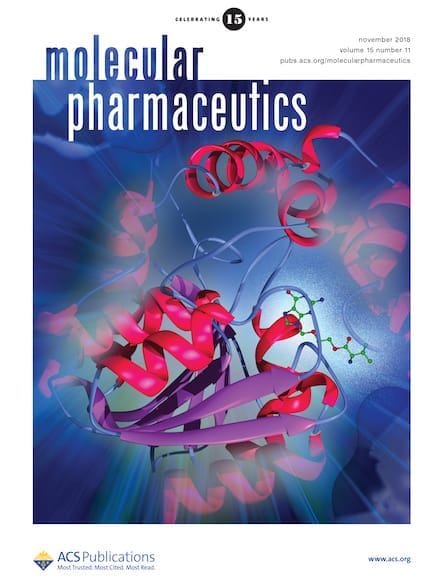The American Chemical Society Division of Publications today named Professor Lynne S. Taylor, Ph.D. of the Purdue University College of Pharmacy as the next Editor-in-Chief of Molecular Pharmaceutics.

The American Chemical Society Division of Publications today named Professor Lynne S. Taylor, Ph.D. of the Purdue University College of Pharmacy as the next Editor-in-Chief of Molecular Pharmaceutics. The journal is the Society’s high-impact publication for original research that contributes significantly to the molecular mechanistic understanding of drug delivery and drug-delivery systems. Taylor will succeed Professor Gordon L. Amidon, Ph.D. of the University of Michigan College of Pharmacy in early 2019. Amidon has served as the journal’s editor-in-chief since its inception in 2003.
Professor Taylor joined the faculty of Purdue University in the department of industrial and physical pharmacy in 2003, where she currently serves as a Retter professor of pharmacy. Her research focuses on enhancing drug delivery through optimizing and understanding the physicochemical properties of drugs and excipients — in particular, amorphous solid dispersions used to improve oral delivery of water-soluble drugs.
Read An Exclusive Interview With New Molecular Pharmaceutics Editor-in-Chief Lynne S. Taylor:
What are your goals as Editor-in-Chief?
As an academic for many years, I have published in a wide variety of journals, both pharmaceutical and across a wide array of disciplines. I’ve always recognized that Molecular Pharmaceutics is a premier journal and I am honored to serve as Editor-in-Chief. The primary goal is to ensure Molecular Pharmaceutics continues to publish cutting-edge research important to the pharmaceutical sciences community. On top of this, at the outset, there are a number of goals that I would like to consider. One early example would be to provide a forum for authors to critically evaluate the current state of the art in the field and lay out the future challenges. It is also important to me to broaden the readership and authorship to reflect the increasing globalization of scientific research.
What do you see as the biggest challenges and opportunities in the field today?
Drug therapy is constantly changing as advancements in fundamental biology occur. The current therapeutic landscape comprises both small organic molecules as well as macromolecules such as monoclonal antibodies and antibody drug conjugates. Even though small molecule therapies have been used for many years, today’s cohort of therapeutics trend towards high lipophilicity and poor aqueous solubility. These physicochemical properties pose challenges for delivery and have led to the development of several novel solubility enhancing formulation approaches. There is considerable interest in understanding these delivery systems at a more fundamental level so that they can be employed in a rational and optimal manner for drug delivery. In addition, delivering drugs to their intended site of action still poses challenges, in particular, accessing solid tumors and crossing the blood-brain barrier. There are many opportunities in these areas, for example, using highly functionalized drug-loaded nanoparticles to target tumors, or in the case of delivery to the brain, to cross the blood-brain barrier. Formulation and delivery of proteins and peptides are frequently challenging, and cutting-edge research is needed in this area. One other topic where I think that we are going to see a lot of activity in over the next few years is in the area of “formulation” of cell-based therapies with the goal of improving stability and enabling more flexibility in dosing.
Why should people outside the field take an interest in Molecular Pharmaceutics? How does it affect people ’s lives?
A phrase commonly used in the area of pharmaceutics is “a medicine is more than a molecule.” I love this phrase as it captures the raison d’être of the discipline of pharmaceutics. The content presented in Molecular Pharmaceutics describes the many challenges involved in taking a molecule and eventually turning it into a product that delivers the drug to the site of action, ultimately benefiting patients. So at the end of the day, Molecular Pharmaceutics impacts patients by publishing innovative and meaningful research that enables better medicines to be developed. It is also valuable for scientists outside the field to appreciate how difficult it is to turn a molecule into a medicine, and the level of interdisciplinary science necessary to achieve this.
Where do you want MP to expand?
I’d like to have more forward-looking commentary and perspective articles by leaders in the field in order to stimulate discussions about tomorrow’s research. Critical reviews and themed issues also offer opportunities to gain viewpoints from different stakeholders involved in the pharmaceutical sciences, including industrial and regulatory scientists.
